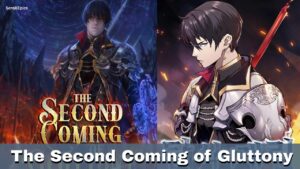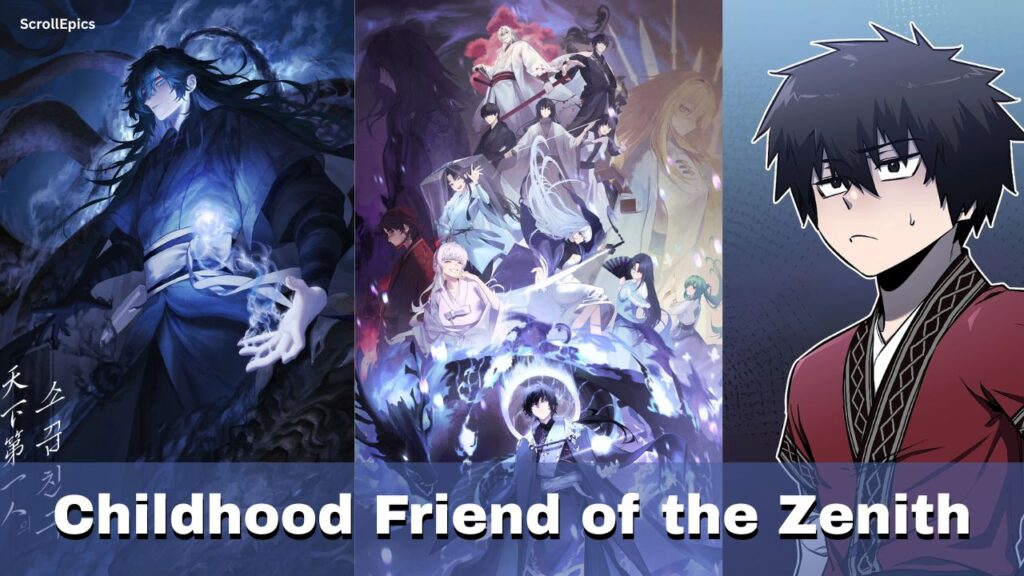
At first glance, The Second Coming of Gluttony seems like your typical redemption fantasy—another down-and-out protagonist granted a second chance in a game-like world. And at the start, that’s exactly what it is.
But don’t let the familiar setup fool you.
This is not a power fantasy. It’s a story about obsession. About shame. About digging through the wreckage of your life and trying—desperately—to become someone different. It’s dark, often uncomfortable, and at times deeply flawed. But when it hits, it hits hard.
The result? A gritty, emotionally charged journey that swings between brilliant character arcs and uneven storytelling—but one that leaves a mark all the same.
Where to Read The Second Coming of Gluttony Online
You can read The Second Coming of Gluttony through the following official platforms:
Wuxiaworld: This is the primary platform offering the complete, officially licensed English translation of the novel.
Reddit
Amazon Kindle: The series is available in a 10-book format for purchase and reading on Kindle devices or apps.
Amazon
Tapas: An alternative platform where you can read the novel, often offering free episodes and a mobile-friendly experience.
These platforms provide legal and high-quality translations, ensuring you enjoy the story as intended by the author and translators.
What The Second Coming of Gluttony Is Really About?
At its heart, The Second Coming of Gluttony is a story about regret.
It begins with Seol Jihu—a man broken by addiction, shame, and self-hatred—given a miraculous second chance. Not in some vague spiritual sense, but literally: his future self, unable to change anything through power or knowledge, sends back only the raw emotion of regret. That overwhelming wave of remorse becomes Jihu’s catalyst to change, and with it, he’s pulled into a new world called Paradise.
But Gluttony isn’t about instant redemption. It’s about the long, agonizing process of earning it.
Seol doesn’t become a hero overnight. He’s impulsive, obsessive, and deeply flawed. His journey is full of setbacks—some external, many self-inflicted. At times, he’s naive. At others, dangerously overconfident. But beneath all of it is someone trying, earnestly, to become better. Not just stronger—but more worthy of the life he’s been given again.
The world of Paradise mirrors that emotional tone. It’s harsh, violent, and unrelenting. Unlike many system novels, where leveling up feels like a checklist, here, every step of progress feels like it costs something. Every decision Seol makes has consequences. And while there are gods, powers, and cosmic threats—at its core, the conflict is always internal.
This isn’t a story about saving the world. It’s about proving—to yourself—that you’re no longer the person who ruined everything the first time.
A Story Told Through Violence—and Vulnerability
The Second Coming of Gluttony isn’t gentle with its characters. It doesn’t hand out victories for free. Fights are brutal, progress is painful, and the stakes are often physical, emotional, and psychological all at once.
But beneath that blood-soaked surface, there’s surprising softness. The rawest moments in the story aren’t the battles—they’re the conversations where Seol Jihu confronts his past, apologizes to people he hurt, or stares down the version of himself he used to be. His growth is written not through dramatic monologues, but through small, difficult choices: staying sober, facing failure, choosing humility over pride.
Even the action reflects this duality. Every power Jihu gains feels earned through intense, often self-destructive effort. There’s no overpowered cheat code, no magic shortcut. He trains, fails, and gets back up—again and again. His spear becomes an extension of his trauma and resolve, not a shiny badge of power.
And while the harem elements often falter or misfire—frequently called out even by fans—the true emotional core of the novel is never romantic. It’s personal. It’s about pain, perseverance, and the slow work of redemption.
A World That Doesn’t Forgive
Paradise, the otherworld Seol is thrust into, isn’t a colorful fantasy realm—it’s cruel, calculated, and unrelenting. Though it mimics a game system with levels and classes, it doesn’t offer the escapism or convenience you’d expect. The world has its own rules, its own history, and most importantly, its own indifference.
That’s part of what makes the story feel so grounded. Unlike many other isekai or fantasy settings, this world doesn’t bend to the protagonist’s needs. In fact, it often punishes him. Towns fall. Friends die. Plans fail. Power doesn’t guarantee safety, and nothing feels predictable.
Even the system itself—built around the Seven Deadly Sins—has limits. It won’t handhold the characters or scale with them artificially. Instead, the strongest remain the strongest, and Jihu must struggle to rise to their level. There’s a consistent ceiling, and breaking through it always comes at a cost.
This consistency gives the story an uncommon tension. You’re never quite sure if Jihu will make it through. And when he does, it’s not because the world allowed it—it’s because he forced his way forward, no matter the toll.
Why The Second Coming of Gluttony Stands Out
At first glance, The Second Coming of Gluttony might seem like just another redemption tale. But it stands out because it commits—completely and unapologetically—to the messiness of that journey.
This isn’t a story that sanitizes growth. Seol Jihu isn’t rewritten into a likable character right away. He stumbles, lashes out, gets manipulated, and loses control. And yet, it’s that emotional honesty that makes his arc feel more real than most. He’s not a hero molded for admiration—he’s a man slowly, painfully, trying to become one.
The novel’s greatest strength lies in its emotional rhythm. For every brutal fight scene or cosmic-level threat, there’s a moment of personal reckoning—where guilt, grief, or gratitude takes center stage. Whether it’s Jihu confronting a mistake, training until collapse, or quietly apologizing to someone he once hurt, the story consistently grounds its fantasy in raw human emotion.
Add to that a tightly structured power system with consistent stakes, intense set-piece battles, and a surprisingly philosophical view on escapism and obsession—and you get a web novel that’s as harsh as it is rewarding.
It’s not perfect. The harem subplot is a misstep for many readers, and the side stories often hurt more than they help. But for those who focus on the main narrative, The Second Coming of Gluttony delivers a fierce, flawed, and deeply human experience.
It doesn’t ask to be admired. It asks to be understood.
Seol Jihu – A Protagonist Defined by Regret
Seol Jihu isn’t born a hero. He isn’t even a good person when the story begins. He’s a manipulative, self-destructive addict—a man who has ruined every meaningful relationship in his life and numbed himself with gambling to avoid facing that truth.
What makes Jihu compelling isn’t that he gets a second chance—it’s how he responds to it. When his future self sends only a crushing wave of regret back through time, it’s not some magical knowledge or superpower that drives him. It’s shame. Overwhelming, suffocating shame.
And he acts on it.
Jihu doesn’t become strong because of luck or talent. He throws himself into training with reckless abandon, desperate to feel worthy of the opportunity he’s been given. He doesn’t fight for justice or glory—he fights because it’s the only way he knows how to move forward.
Throughout the story, his growth is rooted in deeply personal moments. From reliving every painful memory of the people he’s hurt, to confronting how much of his desire to “save the world” is really just a need to feel clean again, his development feels earned. It’s hard, it’s ugly, and it’s never quite finished.
Even when he becomes powerful—an Executor of Gluttony, feared and respected—he still carries that emotional core. His strength isn’t just in his skills or strategies. It’s in the fact that he never forgets who he was, and refuses to be that man again.
Jihu is not the kind of protagonist you idolize. He’s the kind you watch struggle, fall, get up—and root for anyway.
The Second Coming of Gluttony Characters Guide
While Seol Jihu is the heart of the story, The Second Coming of Gluttony is filled with a cast of characters who shape, challenge, and sometimes even surpass him in impact. These aren’t just side roles—they’re fully realized people with their own flaws, pain, and moments to shine.
Seo Yuhui
A central figure in both the plot and Seol Jihu’s emotional journey. Kind, capable, and deeply burdened, Seo Yuhui acts as a guiding force in Paradise. Her relationship with Jihu is slow-burning and grounded more in mutual respect and healing than romance tropes. Despite everything she endures, she remains one of the most dignified and emotionally resonant characters in the novel.
Teresa Hussey
A fan favorite turned controversial figure due to her role in the side stories. In the main narrative, Teresa is one of Jihu’s earliest supporters—loyal, upbeat, and unshakably present during his lowest moments. Her descent in the side stories into something darker left many readers frustrated, but her importance in the main arc remains unquestioned.
Baek Haeju
Stoic, powerful, and enigmatic, Baek Haeju is one of the strongest warriors in Paradise. She plays a vital role in key battles and stands as a symbol of quiet endurance and discipline. Her interactions with Jihu are limited but impactful, often emphasizing his growth and rising status.
Kazuki, Hugo, and Chohong
These three represent Jihu’s early companions during his tutorial and training arcs. Kazuki is reserved and strategic; Hugo is emotional and earnest; and Chohong is fiery and straightforward. Each brings something different to the team dynamic and helps shape Jihu’s path, even if their roles become less prominent later in the story.
The Parasite Queen & Army Commanders
As the central antagonistic force, the Parasite Queen isn’t just evil for evil’s sake—she’s strategic, intelligent, and relentless. Her Army Commanders—like Vulgar Chastity and Exploding Patience—are more than just boss fights. They’re terrifying, memorable enemies who push Jihu and his allies to the brink, especially in the latter arcs.
Notable Powers and the World System of the Second Coming of Gluttony
The Second Coming of Gluttony sets itself apart with a refreshingly straightforward but emotionally impactful power system—one that ties directly into its themes of obsession, effort, and consequence.
Level System – Simple but Effective
Paradise operates on a clear power scale: Levels 1 through 10. Unlike many cultivation or system-based web novels that drown readers in overly complex terminology, SCoG keeps it accessible. Each level represents a tangible leap in strength, and these ranks actually mean something. There are no filler power-ups or bloated scaling—when a character ascends, it’s earned, and the stakes rise with it.
Nine Eyes – The Power of Foresight
Seol Jihu’s signature ability, the Nine Eyes, grants him a rare form of intuition and limited future insight. Color-coded risk perception allows him to gauge danger in real-time, making it one of the most strategic abilities in the novel. But it’s not just a cheat code—its emotional toll, unreliability, and narrative relevance make it a character in its own right.
Executor of Gluttony – Symbol of Obsession
Later in the story, Seol inherits the mantle of Gluttony—a position tied to one of the Seven Deadly Sins and representative of his all-consuming drive to overcome weakness. Becoming an Executor isn’t just a title boost—it’s a reflection of his inner transformation. His trials to earn it, especially the memory-trial arc, are some of the most emotionally wrenching moments in the novel.
The Seven Sins System
The world’s framework is tied to a mysterious and ancient system created by entities representing the Seven Deadly Sins. Each sin corresponds to an Executor and a unique set of principles. Unlike many game systems, this one isn’t omnipotent—it has limits. The system can only empower someone up to a level the Sin itself once reached. Everything beyond that must come from effort and will.
Consistency Over Inflation
Perhaps the most underrated part of SCoG’s power system is how consistent it remains. The strongest characters stay the strongest until they are meaningfully challenged. There are no sudden reversals or forced resets. That stability creates real tension—because when someone like the Parasite Queen sets her eyes on you, survival isn’t guaranteed.
Is The Second Coming of Gluttony Worth Reading?
If you’re looking for a perfect web novel, this isn’t it. But if you’re looking for one that punches you in the gut, makes you uncomfortable, and still leaves you rooting for a deeply flawed man clawing his way out of ruin—The Second Coming of Gluttony is absolutely worth your time.
The novel’s main arc is strong, especially in how it handles character growth, emotional weight, and payoff. Seol Jihu isn’t likable in the beginning—and that’s the point. Watching him slowly evolve from a self-destructive addict to a hardened leader is one of the most satisfying character arcs in Korean web fiction. The battles are intense, the power system is consistent, and the stakes always feel real.
That said, the story has rough edges. The pacing wobbles in later arcs. The harem subplot is, at best, divisive—and at worst, deeply frustrating and at times even disturbing. Many readers suggest skipping the side stories entirely, as they often undo character development or introduce questionable content that detracts from the core experience.
Still, for the main story alone, The Second Coming of Gluttony earns its praise. It’s an ambitious novel with a unique emotional tone—equal parts brutal and sincere. It doesn’t promise a clean journey, but it delivers one that’s unforgettable.
If you can accept its flaws, what you’ll find is a raw, relentless story about redemption, obsession, and what it means to start over when you’ve already hit bottom.
The Second Coming of Gluttony FAQ
What is The Second Coming of Gluttony about?
It follows Seol Jihu, a self-destructive gambling addict who’s given a second chance to change his life after being overwhelmed by regret from his future self. Transported to a parallel world called Paradise, he must confront his flaws, battle powerful enemies, and redefine who he is—both to himself and others.
Where can I read The Second Coming of Gluttony?
You can read the official English translation on Wuxiaworld, or purchase the full series in volumes through Amazon Kindle and Tapas.
Is the novel finished?
Yes. The main story is complete with 489 chapters. There are also side stories, though they are widely considered controversial and are often recommended to skip by fans.
Does it have romance or a harem?
The main story ends with a clear romantic conclusion involving one woman. However, it includes harem-like elements throughout, and the side stories explore these in ways that many readers found mishandled or even damaging to the original character arcs.
How is the power system structured?
The novel uses a clear level-based system (Levels 1–10) alongside unique powers tied to the Seven Deadly Sins. Seol Jihu’s primary ability, Nine Eyes, gives him limited foresight. He later becomes the Executor of Gluttony, reflecting both his power growth and internal struggles.
Is it violent or dark?
Yes. The novel includes graphic violence, psychological trauma, and several emotionally intense moments. It doesn’t shy away from depicting suffering and moral complexity, and some scenes can be disturbing.
Is the side story necessary?
Not really. While it offers additional epilogues and “what-if” scenarios, many fans feel the side stories weaken the ending and contradict the character development from the main plot. If you want a strong, satisfying close—stop at the end of the main story.

